The Board of HKU’s Institute of Oriental Studies came up with the idea for an academic college of residence for outstanding overseas scholars and elite local research students in 1957. The University’s Vice-Chancellor at the time, Sir Lindsay Ride followed up the idea, and then Sir Robert Black, Hong Kong Governor and Chancellor of HKU oversaw the start of construction in 1963.
Said Mrs Annie Bentley, Chair of the Robert Black College (RBC) Management Committee: “Sir Robert Black wanted it to be a place of academic energy and vigour, in both the Chinese and Western context. Remarkably, through half a century it has managed to remain – and will continue to be in future years to come – an oasis of tranquility and charm in an increasingly busy and fast-paced campus.”
The College is as famous for its blue-glazed tiles and architecture – which are reminiscent of the Tang Dynasty and designed by renowned local architect Sir Szeto Wai – as it is for being a tranquil haven from the city with quiet courtyards and covered walkways. Major donors to the College were Sir Shiu-kin Tang and John Swire and Sons. The latter still supports the College’s nine Swire Scholars – all top research students at HKU – jointly with funding for accommodation from the College.
“The scholarships are very prestigious,” said RBC Assistant Master Mable Tang. “There are a total of nine scholars who stay at the College for a maximum of three years. It’s not a cash scholarship, it is accommodation. They represent the best of the best from across the Faculties.“
Former Swire Scholars include film director Ann Hui On-wah, former Director of HKSAR’s Social Welfare Department Dr Stephen Frederick Fisher and internationally renowned chemist Professor Vivian Yam Wing-wah.
The current and eighth Master of the College is Professor C Y Jim, HKU Chair Professor of Geography, and himself a Swire Scholar in the 1970s. He describes his duties as two-fold: “One, managing what is basically a boutique hotel for visiting academics, and two, providing pastoral care for the nine Swire Scholars.” He also helps organise regular functions, inviting people to give talks, workshops etc. Those functions include the regular Ambassadors Nights for HKU academics and outside guests, for which Swire Scholars choose the topic for the talk, and lead the question and answer session afterwards.
“RBC is special to HKU as it is operated by the University itself,” he said. “Guests can go to hotels but most opt to stay here where there is a scholarly ambience and a chance to meet other academics – both visiting and the Swire Scholars. It puts visiting scholars directly on campus – and far from Hong Kong’s madding crowds – so it is quiet and offers plenty of scope for reflection and to work in peace.
“We have lots of returning guests – some even specify a favourite room for their return visits. Some visiting scholars stay months, and they are welcome to stay longer.” Famous guests include: Nobel laureate Physics Professor Daniel Tsui Chee; HKU’s first Chinese Vice-Chancellor, the late Professor Rayson Huang; Lady Pamela Youde, wife of the late Hong Kong Governor Sir Edward Youde; former Vice-Chancellor Professor Wang Gungwu; and Mrs Barbara Black Rust, daughter of the College founder and former Hong Kong Governor Sir Robert Black.
Asked which his favourite part of the College is, Professor Jim said: “It has to be the courtyards – they are lovely in both natural and cultural terms. The greenery is beautiful and we see amazing wildlife there including squirrels, civet cats and all sorts of birds.”
Robert Black College has put together four events to mark the golden anniversary, organised by the Chairman and staff. Mrs Bentley has been on the board for 12 years and Chair since 2011. She is also an HKU alumna, graduating in 1971, just four years after RBC opened. Asked to sum up the philosophy behind the College, she refers to two large embroideries which sit side by side in the RBC’s Swire Lounge.
“One is a flying Apsara, a mythical image found in the Dunhuang murals on the Silk Road. These caves are also known as the Thousand Buddhist Grottoes and contain some of the finest examples of Buddhist art spanning more than a thousand years. The other is Guan Gong, a famous general of the Three Kingdoms Dynasty. He represents integrity and loyalty, and he is venerated even by the Hong Kong Police Force.
“Guan Gong embodies much of Confucian philosophy of the dominant Han majority people in central China, and the Apsara presents Buddhist art and culture of the minority tribes in Asia Minor and western China,” said Mrs Bentley.
There is also a third picture in the room – an embroidered reproduction of Gustav Klimt’s work The Kiss, whose predominantly gold colouring symbolises the 50th anniversary. “The first two pictures basically represent the Orient, while the Klimt could not be more Western,” said Mrs Bentley. “Although East meets West is a cliché, it is still what constitutes an essential element of Hong Kong. That is beginning to change, but at this moment it remains true. A happy meeting of East and West is what we want Robert Black College to be.
“Eighteen months ago, when we began planning the golden anniversary celebrations, I started thinking about the College’s beginnings and it struck me as quite incredible that Swire and Sir Shiu-kin Tang decided to donate money for the creation of such a place just prior to the 1967 riots which was a very turbulent time for Hong Kong. However, their faith in Hong Kong and HKU was well-placed and we are fortunate to have such a wonderful stage for the convergence of intellect and culture.”
![]() [Robert Black College] puts visiting scholars directly on-campus – and far from Hong Kong’s madding crowds – so it is quiet and offers plenty of scope for reflection and to work in peace.
[Robert Black College] puts visiting scholars directly on-campus – and far from Hong Kong’s madding crowds – so it is quiet and offers plenty of scope for reflection and to work in peace. ![]()
Professor C Y Jim
Anniversary events
The first event to celebrate the College’s 50 years was ‘Forward We GOLD’, an anniversary dinner, organised by the Swire Scholars Association in January. That was followed in February by Good As Gold Opera Evening, a concert celebrating Western opera and featuring singers from the London Festival Opera, alongside three local opera singers and a pianist, and 15 undergrads from the university choir. In March, a premiere cantonese opera was performed to celebrate Heritage Cantonese Opera (HCO) – Monk Biancai Releases the Demon is sung in the Guilin vernacular and receded in popularity against repertoire sung in the Cantonese dialect. “We had to have Chinese and English subtitles,” said Mrs Bentley. “But we chose HCO as it became obsolete in Hong Kong shortly after the 1960s. Veteran Law Kar-ying led the concert and is a top singer of this kind of opera, but he is approaching 70, so who will keep the tradition going? We wanted to choose something special for the RBC concert, to show HCO to a new audience. Perhaps we can help revive it.”
As important to Mrs Bentley as the content of the events were the audiences invited to enjoy them. “For the Good As Gold Opera Evening concert we had not only HKU students, alumni, academic and administration staff, but also choirs from some of Hong Kong’s best secondary schools. We found a sponsor to give free tickets to schools, who then auditioned their choir members to see who would benefit most from attending the concert. We also sponsored a charity supporting children with epilepsy to come.
“For the HCO concert the audience list included 75 students from schools where Cantonese opera is part of the curriculum. The make-up of the audience is relevant to what I want RBC to achieve. It is all about bringing town and gown together in the same way the College brings people together.”
Other events include a talk by Hung Leung Hau Ling Distinguished Fellow in Humanities Professor Lung Yingtai scheduled for October, and a joint exhibition with University Museum and Art Gallery scheduled to run from December, 2017 to February, 2018.
But perhaps the most striking sign of renewal is the make-over to the main entrance of the College. The old wooden signage above the main entrance has been replaced with a new one, based on calligraphy by Professor Jao Tsung-I and engraved by renowned wood carver Mr Cheung Sing-hung. The new plaque was donated by the former Master Professor Cheng Kai-ming. New English signage has also been installed on the upper beam of the entrance. Mrs Barbara Black Rust officiated at the unveiling ceremony in November, 2016.
Brian Chan
BSc in HKU as an undergraduate, double major in Physics and Astronomy. He is currently an MPhil student in the Department of Physics, focussing on Astrophysics.
I love the College environment and the beautiful Chinese style architecture – particularly the antique rooftop. The residents here are usually extremely bright and intelligent researchers, for example professors from top universities or research journal editors, who are nice to chat with. It is literally the best living environment you can find on campus.
Words from Swire Scholars
Words from loyal guests
Rachel Yiu
Pursuing a double degree at the Li Ka Shing Faculty of Medicine in MBBS and an intercalated PhD (MBBS/PhD), and expecting to graduate in 2020. The PhD is in Surgery, specialising in paediatric liver diseases.
I am quite an explorer and simply enjoy life, meeting new people, exchanging new ideas and cultures on both casual and academic grounds. To me, being one of the College student ambassadors is a once-in-a-lifetime experience where you gain valuable ideas, advice and friendships, and challenge yourself to go beyond your major with an open mind about the world we’re living in. I like all the people who make the College what it is. From our Master, Assistant Master and College staff to my fellow Swire Scholars and guests, they are the pillars and bricks on which the College is built!
Professor Liaquat Hossain
Faculty of Education, HKU
A loyal guest since June, 2013, when he stayed at RBC while being interviewed for a Chair position at HKU. He has since stayed several times.
Coming from Australia, I was concerned about living in such a busy city as Hong Kong. The Robert Black College made the transition so much easier. You are on campus, so you are in the heart of things, yet you are in a peaceful place, with beautiful view of the mountains and harbour and you feel close to nature.
The breakfasts are a great time to meet visiting professors and scholars and to exchange ideas, form informal cliques, talk about each other’s work and swap impressions of Hong Kong and HKU.
Andrew Hoang
BA (Honours) in philosophy and criminology from Western University, Canada. MSW from Wilfrid Laurier University, Canada. Now pursuing his doctorate in HKU’s Department of Social Work and Social Administration. Also, Chairperson of Swire Scholars Association.
At Robert Black College, something new – an idea, an event, a curiosity – is always on the horizon. It is a privilege waking up each morning, knowing that you could potentially discuss and learn something exciting over breakfast with your fellow College mates and visiting guests. At the same time, there are enduring aspects of the College that bring a sense of peace and belonging – its tranquility, the friendliness and devotion of the staff, and the several species of birds whose songs signal the start of a new day. I start and end each of my days here feeling very lucky, and very grateful.
Furthermore, academic, professional and personal lives can be nurtured and come alive when you have a space on campus dedicated to bringing both developing and established scholars together.
Professor Alison W Conner
School of Law, University of Hawai’i at Manoa
A loyal guest since the 1990s.
I first saw Robert Black College in the mid 1980s, when I was teaching at HKU and we would put guests up at the College. I loved the place and then in the mid 1990s when I went to Hawaii I returned as a guest myself. I’m a big fan – it is a community, which is the whole point of a residential college. The community and academic atmosphere is unique – while you are staying here, be it short- or long-term, you are viewed as a member of the University.
Across the board, the staff are outstanding – from the office, the dining room, through house-keeping to the groundsmen – they are kind and attentive and combine to create a wonderful atmosphere. My feeling is that while HKU is constantly changing and expanding, as a university should, the Robert Black College has a great sense of continuity and calm.
Professor C Y Jim (centre) and the Swire Scholars taken at the 'Forward We GOLD' dinner in January, 2017.
Mrs Barbara Black Rust (fourth from left in the first row), daughter of Sir Robert Black, was invited to the Unveiling Ceremony at the main entrance on November 29, 2016.
The two large embroideries featuring a flying Apsara and Guan Gong respectively (top) and the embroidered reproduction of Gustav Klimt’s work The Kiss (bottom) in the Swire Lounge of the Robert Black College represent
Mrs Annie Bentley’s great aspiration of the College being the cultural convergence of East and West.
Good As Gold Opera Evening, performed by three soloists from the London Festival Opera, three local soloists and a local pianist, and a 15-member choir from HKU’s Music Department, was held at the Grand Hall, HKU, in February, 2017.
Monk Biancai Releases the Demon performed by a troupe of more than 15 performers and 10-member Cantonese orchestra led by the renowned artist Mr Law Kar-ying, was staged at the Grand Hall as one of the events celebrating 50 years of the Robert Black College.
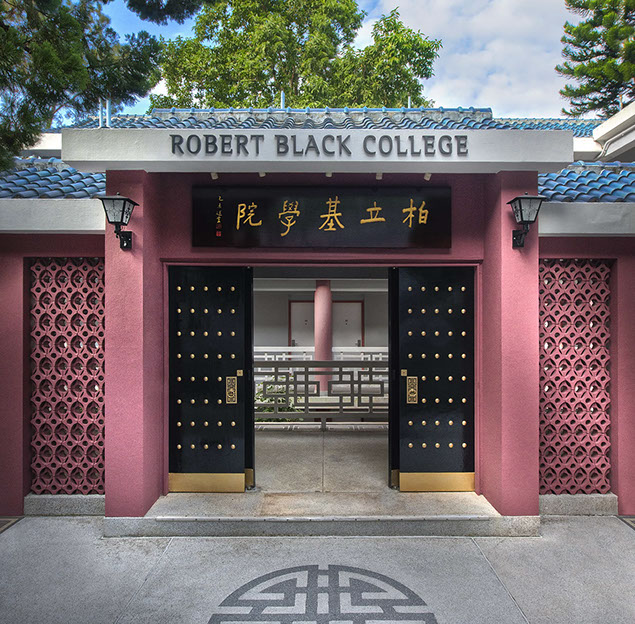
A Haven For Scholarly Exchange Celebrates Its Golden Anniversary
Opened in 1967 with the aim of providing a meeting point for outstanding local and global academic minds to enjoy each other’s company and exchange ideas, Robert Black College is celebrating its 50th anniversary.
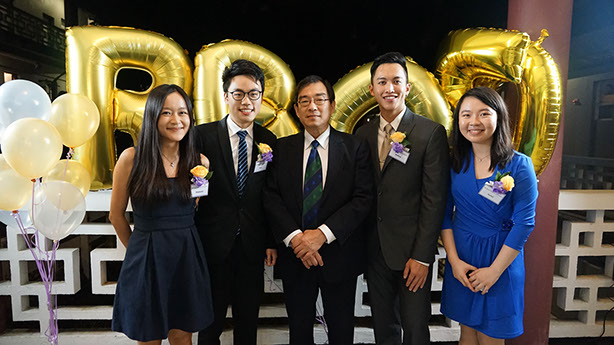
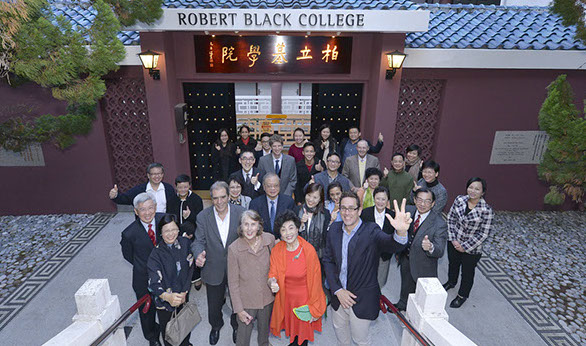
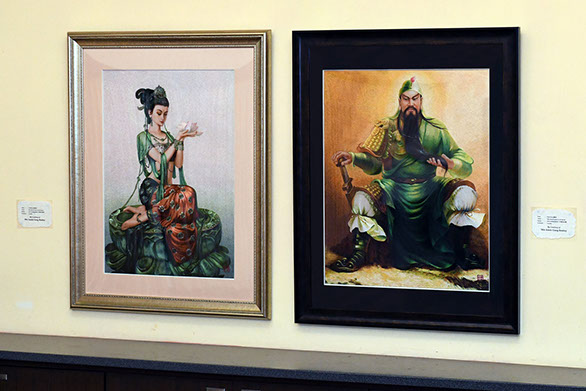
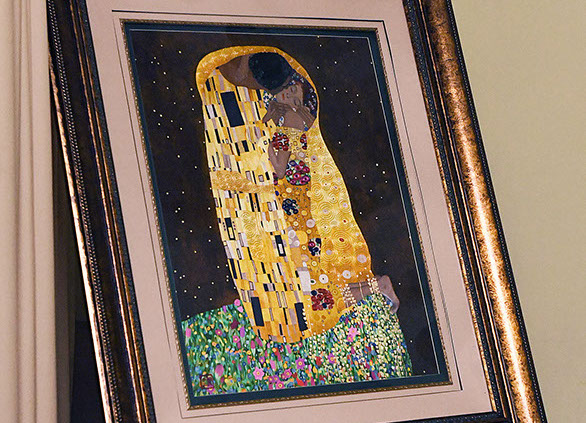
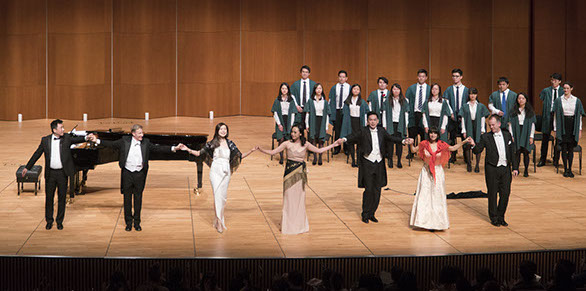
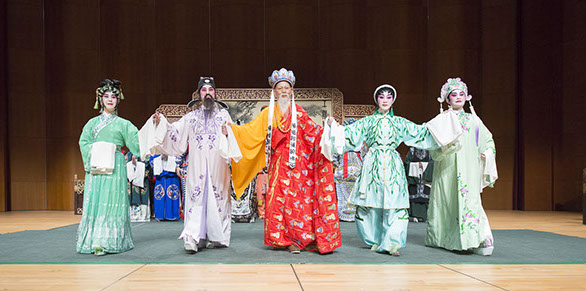
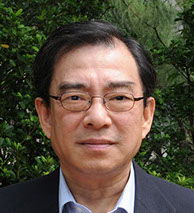
Robert Black College welcomes its new look in celebration of its 50th anniversary. The wooden plaque at the main entrance was replaced in November, 2016 based on the calligraphy by Professor Jao Tsung-I, donated by the former Master Professor Cheng Kai-ming. The new English signage of the College has been installed at the upper beam of the entrance.


